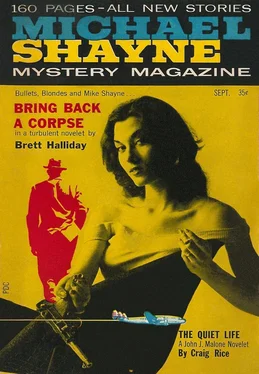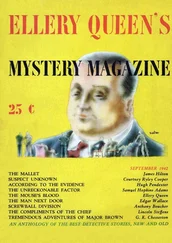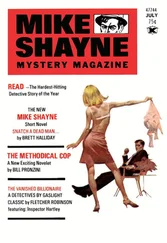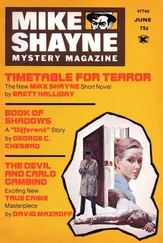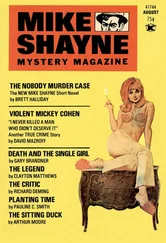Robert Bloch - Michael Shayne Mystery Magazine. Vol. 1, No. 1. September 1956
Здесь есть возможность читать онлайн «Robert Bloch - Michael Shayne Mystery Magazine. Vol. 1, No. 1. September 1956» весь текст электронной книги совершенно бесплатно (целиком полную версию без сокращений). В некоторых случаях можно слушать аудио, скачать через торрент в формате fb2 и присутствует краткое содержание. Город: New York, Год выпуска: 1956, Издательство: Renown Publications, Жанр: Детектив, на английском языке. Описание произведения, (предисловие) а так же отзывы посетителей доступны на портале библиотеки ЛибКат.
- Название:Michael Shayne Mystery Magazine. Vol. 1, No. 1. September 1956
- Автор:
- Издательство:Renown Publications
- Жанр:
- Год:1956
- Город:New York
- ISBN:нет данных
- Рейтинг книги:3 / 5. Голосов: 1
-
Избранное:Добавить в избранное
- Отзывы:
-
Ваша оценка:
- 60
- 1
- 2
- 3
- 4
- 5
Michael Shayne Mystery Magazine. Vol. 1, No. 1. September 1956: краткое содержание, описание и аннотация
Предлагаем к чтению аннотацию, описание, краткое содержание или предисловие (зависит от того, что написал сам автор книги «Michael Shayne Mystery Magazine. Vol. 1, No. 1. September 1956»). Если вы не нашли необходимую информацию о книге — напишите в комментариях, мы постараемся отыскать её.
Michael Shayne Mystery Magazine. Vol. 1, No. 1. September 1956 — читать онлайн бесплатно полную книгу (весь текст) целиком
Ниже представлен текст книги, разбитый по страницам. Система сохранения места последней прочитанной страницы, позволяет с удобством читать онлайн бесплатно книгу «Michael Shayne Mystery Magazine. Vol. 1, No. 1. September 1956», без необходимости каждый раз заново искать на чём Вы остановились. Поставьте закладку, и сможете в любой момент перейти на страницу, на которой закончили чтение.
Интервал:
Закладка:
He sat there, unheeding, muttering to himself. The throbbing in his head grew worse.
Finally, he got up and went into the kitchen. She had filled the sink with hot water, had begun to wash up. Mechanically, through force of habit, he took up the dishcloth. “You wash,” he said in a toneless voice. “I’ll dry.”
She said nothing — simply went on washing, stacking the plates and dishes on the draining board. Idly, he picked up the carving knife they so seldom used.
“John,” she said, without looking round, “it is really getting rather difficult — about the money, I mean. Do you think you could let me have a little more, for the household budget? I don’t mind your taking the girl out so much — but I do mind letting things get shabby when they ought to be — well, kept nice, or replaced when they wear out.”
A flame of anger surged up within him. Her back was towards him, as he rinsed the vegetable dish. Mentally choosing a spot, on the left side, he drove the knife into her back with all the force he could muster, stepping aside as he did so, in case the blood spurted. She collapsed over the sink.
He stepped back with a gasp of horror at what he had done. He stood there, trembling violently, for a long time. Presently, he got hold of himself. His hands were still shaking, but he was able to think coherently. He must get away. Yes, but first he must make it look like — like what? Suicide was impossible. It would have to be an attack — an attack by some tramp or marauder...
He went to the back door, unbolted it, took off his shoes, stepped out in his stocking feet. He found a muddy patch in the tiny yard and trod in it. Then he came back in and crossed the kitchen to the sink, leaving a satisfactory trail of vague, amorphous, muddy prints.
To touch his wife’s body brought on a kind of sick horror — but the thing had to look as if she had been attacked. He seized it, pulled it away from the sink, gripped the front of her dress, tore it violently. Then he let the body fall, bent down and tore one of her stockings.
Finally — and for this, he had to turn his head away — he picked up a brush with long stiff bristles and a heavy wooden handle. Holding it by the bristles to avoid leaving fingerprints, he struck her with it across the face.
He looked at the sink. He must leave that as it was — it appeared natural enough — the washed dishes stacked on the left, the unwashed cutlery waiting on the right, the water still soapy.
What about the carving knife? Nerving himself, John dropped it into the still warm water in the sink. Then he looked at his feet. They were almost dry and no longer left prints on the linoleum.
He went out into the hall, put on his hat, coat and gloves, searched about until he found his wife’s handbag. This he took into the kitchen. There he emptied the contents on the floor and put in his pocket the little money it contained.
From a drawer in the dresser, he took out a small, cheap cash-box. It was unlocked, but he deliberately locked it and tossed the key out of sight on the top shelf of the dresser. He forced it open again with a screw driver, removed and pocketed the money, then threw it down on the floor, beside the handbag.
This seemed about all he could do. It looked pretty good, he thought. He went to the back door, put on his shoes again and went out, leaving the door open and the lights on.
It was lucky he had not come by subway, as he normally did. Plenty of people at the station knew him. Very well, then, he would hop a bus to Queen’s Village and spend an hour or so in the bars — get good and drunk, perhaps. Then he’d come home late by subway. The station attendant would notice him. He’d buy a batch of tokens and would remark that he had been on a pub-crawl, drinking, ever since Jimpson had dropped him off.
Who would find her? With something of a shock, he remembered that her sister Mabel, and Mabel’s husband, had arranged to come round after supper, for “a drink or two and watch the fights on T.V.”
Well, that was okay — it would make things easier. By the time he got home, the police would be there and he’d have only to stick to his story.
In Queen’s Village, over his first double bourbon, he thought of two improvements on his story. First, on his way to this bar, he had noticed a movie, with the name of a picture he had already seen. He would say he had dropped in at this movie, before beginning his pub-crawl.
The second improvement was an answer to the inevitable question — why had he not gone home? Well, he would say he had phoned his wife — they couldn’t check that — and told her he’d be late, as he was meeting a business acquaintance for a drink. Tomorrow, first thing, he’d get hold of Ben Tomlin and reproach him with not having turned up for this appointment. Tomlin was never sober after eight o’clock, and had a memory like a sieve — he wouldn’t even try to deny it.
It was in the fourth bar he visited that he switched bourbon to beer. He stood, with a glass in his hand, listening vaguely to the conversation of two very fat men who stood near by.
“Well, I’ve told her before,” said one of the men, “that I won’t have all that yack-yack and gossip going on every day in my house. Like a flock of hens, some of these women. You’d think they’d no homes, of their own. So I told her, well, I said, it’s got to stop, see?”
“Ah,” said the other man weightily. “You can tell them.”
“That’s exactly what I’m getting to. I go in last night, see, after supper, and she’s washing up. ‘Have those cackling women been around again?’ I says. ‘No,’ she says. So I say, ‘How is it you’re washing up four cups and four plates and four of everything?’ And then she says...”
There was a crash, as a beer glass fell to the floor. The two fat men turned. The man who had held the glass was looking at them, with an expression of horror. But he wasn’t seeing them. He was seeing, instead, a little picture, no longer remote but very vivid and real — a picture of a kitchen sink, of washed plates, of unwashed cutlery.
Two of everything! His fingerprints would be on that unwashed cutlery! As he turned and stumbled out, the throbbing in his head came back, harder and angrier than ever. Half an hour later, they removed his body from under a subway train in Queens Village Station.
Walk Away Fast
by Hal Ellson
What lies beneath a sidewalk feud? Sometimes the roots are imbedded in fear sometimes in boredom, sometimes in crime gone awry, sometimes in jealousy for a teen-age tart. Between Buster and Irish, hatred grew from all four causes toward a night of terror that found death at their elbows. It was time to—
I
Randy and me go to the same school. All kind of kids go there, Irish, Spanish, Colored, even two Chinese. Me, I’m Irish.
Randy’s colored. First time I met him I didn’t like his guts, and he didn’t like mine. We almost had it out, but that’s history. Now we get along good. The fact is, he’s about the best guy I know.
When vacation rolls around, we don’t see each other. A couple of weeks go by, and I run into him. He’s out of his territory, I’m out of mine.
We slap hands and talk, mostly about what we’ve been doing. Nothing’s shaking in my neighborhood ’cause the cops are riding the streets too much.
“Yeah, we’re hitting the freight yards tonight,” Randy says. “Want to be in on it?”
That sounds like excitement and, before I know it, I agree.
“Okay, Irish. You come around tonight,” Randy says to me.
“Yeah, suppose your boys don’t like the idea?”
Читать дальшеИнтервал:
Закладка:
Похожие книги на «Michael Shayne Mystery Magazine. Vol. 1, No. 1. September 1956»
Представляем Вашему вниманию похожие книги на «Michael Shayne Mystery Magazine. Vol. 1, No. 1. September 1956» списком для выбора. Мы отобрали схожую по названию и смыслу литературу в надежде предоставить читателям больше вариантов отыскать новые, интересные, ещё непрочитанные произведения.
Обсуждение, отзывы о книге «Michael Shayne Mystery Magazine. Vol. 1, No. 1. September 1956» и просто собственные мнения читателей. Оставьте ваши комментарии, напишите, что Вы думаете о произведении, его смысле или главных героях. Укажите что конкретно понравилось, а что нет, и почему Вы так считаете.
